Your basket is currently empty!
How the Platypus Came to Be
Welcome to Easy Stories in English, the podcast that will take your English from OK to Good, and from Good to Great. I am Ariel Goodbody, your host for this show. Today’s pre-intermediate story is called How the Platypus Came to Be. As always, the transcript and PDF are available at EasyStoriesInEnglish.com, and you can find the link in the description.
[intro]

So, I come to you on a cold, dark autumn’s night to deliver this story. And if you’re watching on YouTube, you might notice that things are a bit more empty behind me. And if you’re very good at listening, you will notice that this room is a bit more echoey than usual. Hello, hello, hello, hello!
That’s because I’m moving house in just a few days. Now, to be fair, by the time you hear this, I will have already moved, but as I am recording this, I am just finishing packing up my things, and in just a few days, I will be moving out.
Well, it’s been about one year since I moved to London, and I’m moving almost exactly a year after I moved in here.
So, what has changed in this past year? Well, as I’m sure you can imagine, a lot! Living in London has completely changed my life. I don’t think it’s an exaggeration, I don’t think it’s too much to say, that this has been one of the most exciting and dramatic years of my life.
I’ve grown so much in independence as a person. I think I’ve created really great new work for the podcast. I’ve made amazing friends. I’ve dated so many people. Oh, I’m so busy dating people! Everybody wants a piece of Ariel Goodbody, huh! Just kidding. Actually, that’s the problem… Joking! The dating is going well, OK? So don’t cry for me, Lovely Learners.

Do you know that song? Don’t cry for me, Argentina. That’s from the film Evita, a movie musical. And in the film version, Evita was played by Madonna. Speaking of famous pop stars, and speaking of movie musicals, the new Wicked film has just come out. If you really know me well, then you will know that Wicked is one of my favourite musicals. And the book which the musical is based on, the original novel, Wicked, is my favourite book ever. I love that book so much.
Now, at the time of recording, I have not seen the Wicked film. I’ve been too busy moving, and I am really excited to go and see the film, but I also know I’m going to have complicated thoughts about it. Because I love the musical, but every time I see the musical, I think about how much better the book is, and I wish that the film took more from the novel. I really hoped that was what they were going to do, but I’ve read a few reviews and it sounds like that’s not the case. Aww, annoying!
Anyway, um, a lot of that was improvised, but it’s all fantastic listening practice for you.
Generally, you might be able to tell from the way I am acting, I’m a bit stressed. Hmm, I wonder why? However, I am greatly looking forward to Christmas. In fact, I don’t think I have ever looked forward to Christmas this much in my life.
Now, partly it’s because I’m stressed and I’m looking forward to free time, food and alcohol, but I think it’s also because I’ve been living in London and, I don’t know if it’s just years of British romantic comedies all making London look so romantic at Christmas, I don’t know if it’s the beautiful Christmas lights in the city centre, I don’t know if it’s just because I’ve left home and I get nostalgic about my childhood, but I’m really looking forward to Christmas.

And this year, my brother and my sister are going to be staying at my parents’ as well, and ugh. I just, I’m just really excited! I’m just really in the Christmas spirit this year. I kind of feel like I’m in the film Bridget Jones’s Diary. Bridget Jones’s Diary is an iconic, a very important, British romantic comedy film from the 90s and, uh, I like to think I’m a bit more successful in love than Bridget in the film, but certainly the romantic atmosphere of London at Christmas is something I love about the film.
Now, these British romcoms, romantic comedies, they always show all this snow. They show so much snow. They make people think it snows every year in the UK. And I had a student who comes from a country where it doesn’t snow ask, well, when will it start snowing? Because we had a bit of snow the other day, but not proper snow.
And I had to tell her, um, it snows about once every three years, and it’s usually not thick enough to settle, to stay on the ground without melting. So, you can blame Bridget Jones’s Diary for making you think that it’s going to snow in London. If it does snow in the UK, it’s more likely up north, especially in Scotland.
In fact, I think you should blame Hugh Grant especially for this myth that it snows every year in the UK. It’s simply not true.
So let’s talk about today’s story so that I don’t keep on talking until the end of time. Today’s story is one of my favourite kinds of stories. It’s the story of how something came to be.
When we ask how something came to be, we are asking how it began. For example, there are many folk tales about how certain animals came to be. In today’s story, we’re going to learn how platypuses came to be – they are such strange animals that there has to be a good story behind them!
And on that note, I’ll just explain the words in the story.
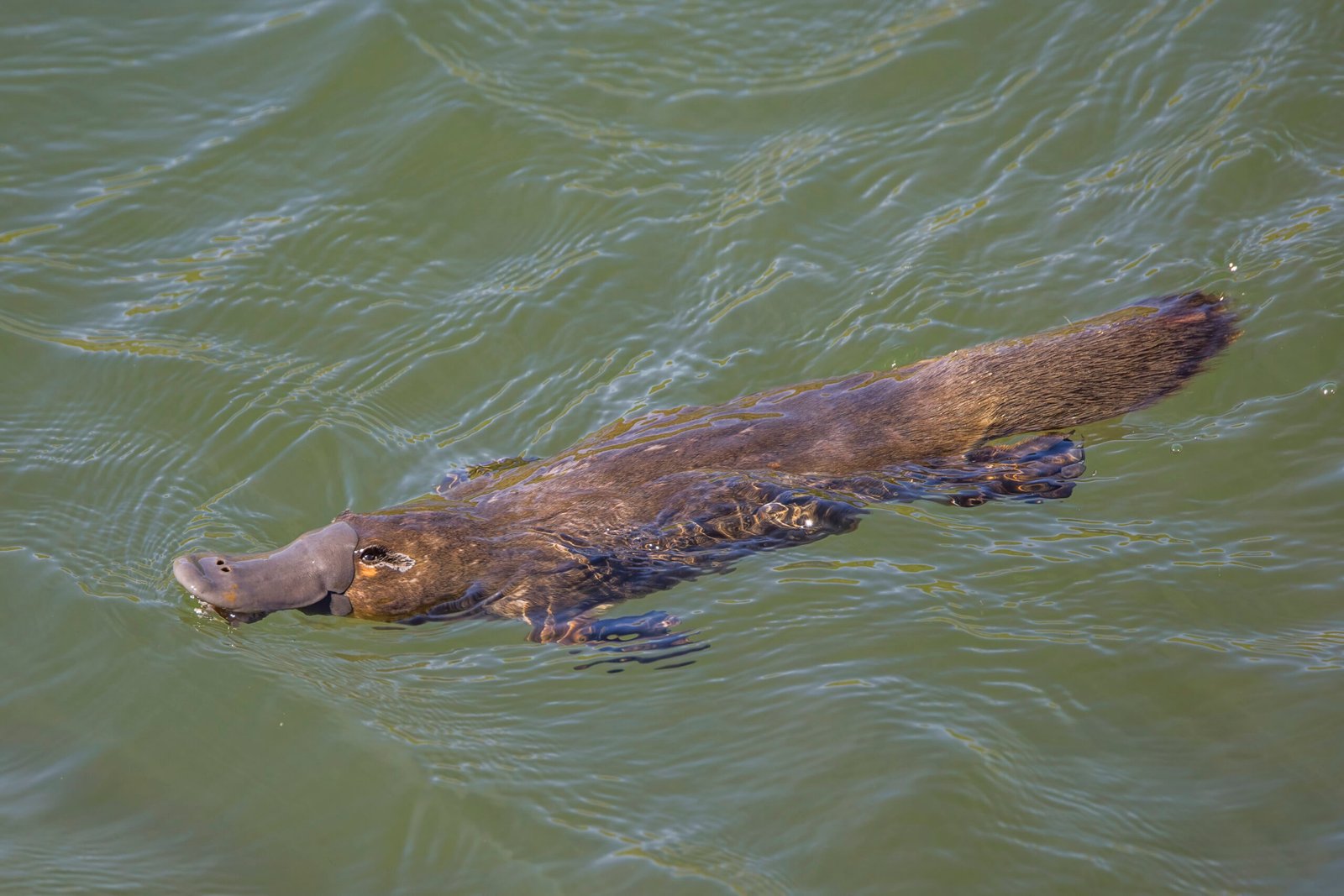
A platypus is a very strange animal. Platypuses are mammals – animals that make milk and lay eggs. Platypuses live in Australia, and they have a mixture of different features from other animals. Platypuses have beaks like ducks. Beaks are birds’ noses – beaks are harder than other animals’ noses, as birds use them to pick up food. In fact, the first time a platypus was seen by Europeans, they thought someone had sewn a duck’s beak onto a mammal’s body. They simply couldn’t believe that this was a real animal.
When you can’t be bothered to do something, you are too lazy to do it. For example, if you get home from a long day at work, you might take off your clothes and throw them on the floor and say, ‘I can’t be bothered to pick them up!’ Often, on a Friday night after work, I can’t be bothered to cook, so I go to a restaurant instead.
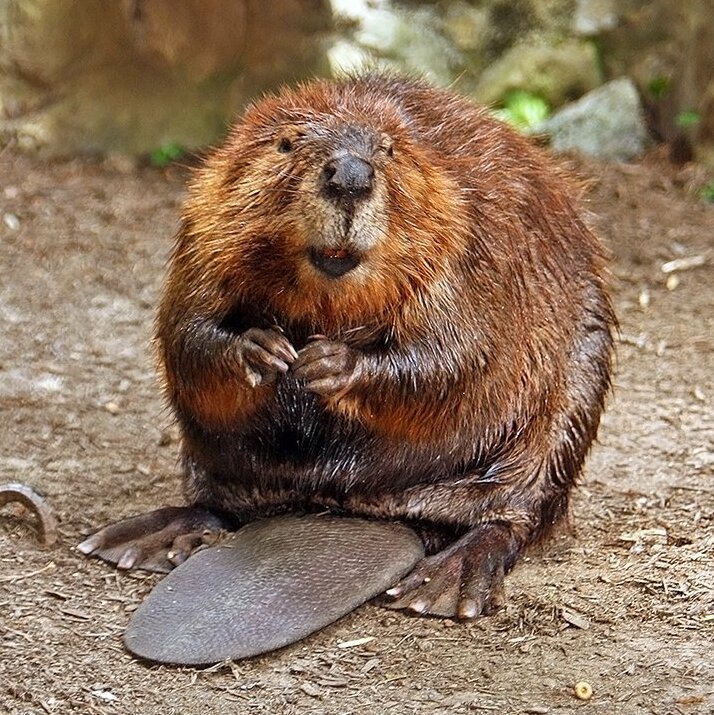
Pester means to bother or annoy someone repeatedly. Children are known for pestering their parents when they’re trying to do something important, for example by coming into the room and saying, ‘Mum! Mum! Mum!’ Cats also like to pester their owners by distracting them when they’re working and knocking things off tables.
Beavers are animals with long fur, sharp teeth and wide, flat tails. A tail is the back part of an animal’s body. For example, dogs wag their tails, move their tails from side to side, when they are happy. Beavers often hit their tails against water. Beavers mainly live in Canada. Beavers use their sharp teeth to cut wood and use the wood to make dams.
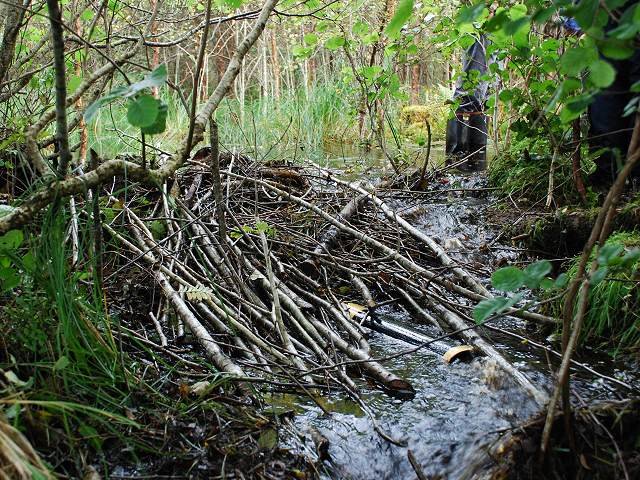
Dams are walls that are built on top of large rivers. Dams stop a river’s flow and collect the water, so that it can be used to provide water for an area. Beavers build dams out of wood to make an area of water where they are protected from animals that want to eat them, and they can store their food there over winter.
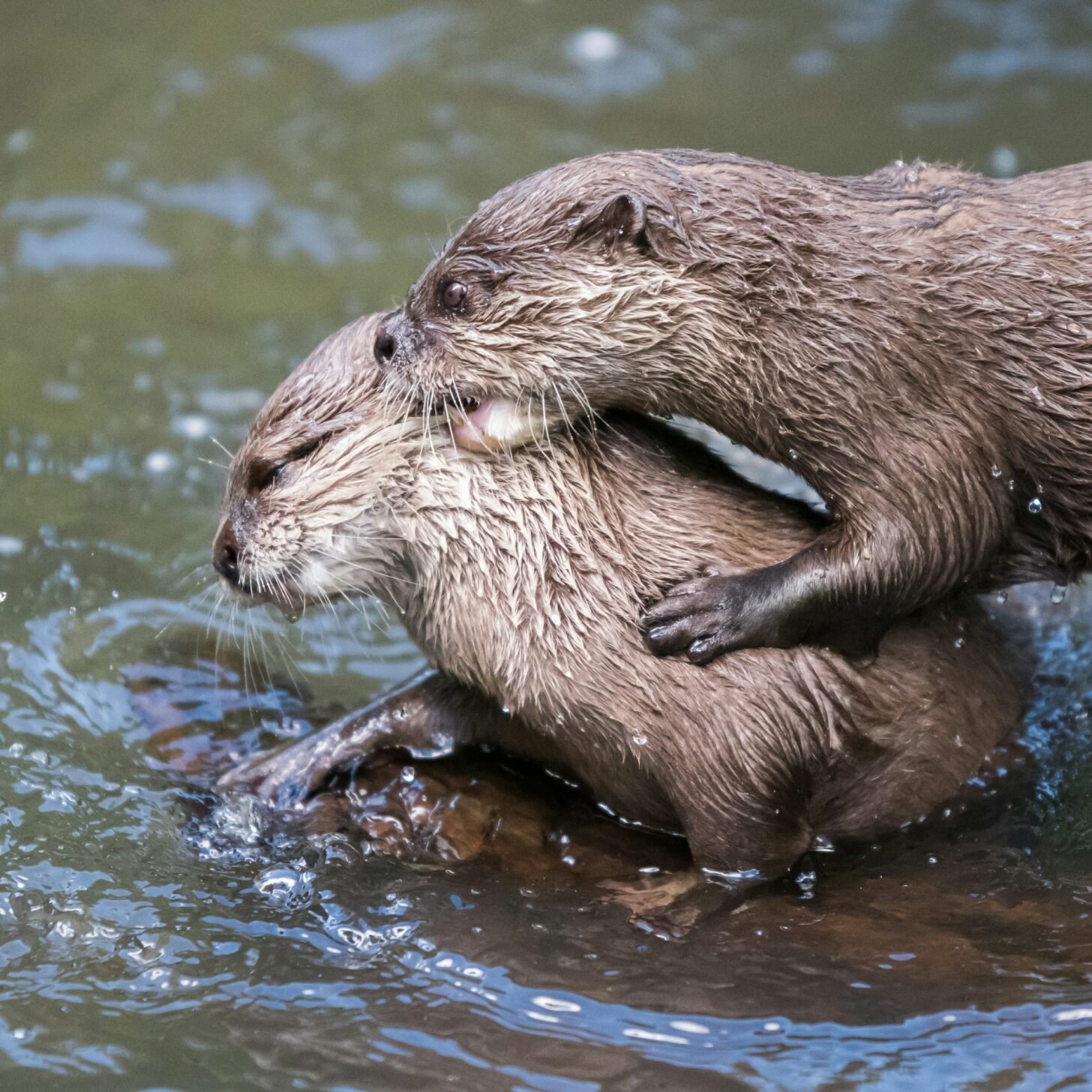
An otter is a mammal with smooth fur that lives in water. Otters are thin and can swim very well. Otters eat shellfish – such as molluscs – and they break them open by lying on their back, putting the shellfish on their stomach, and hitting them with a rock.
OK, so listen and enjoy!
How the Platypus Came to Be
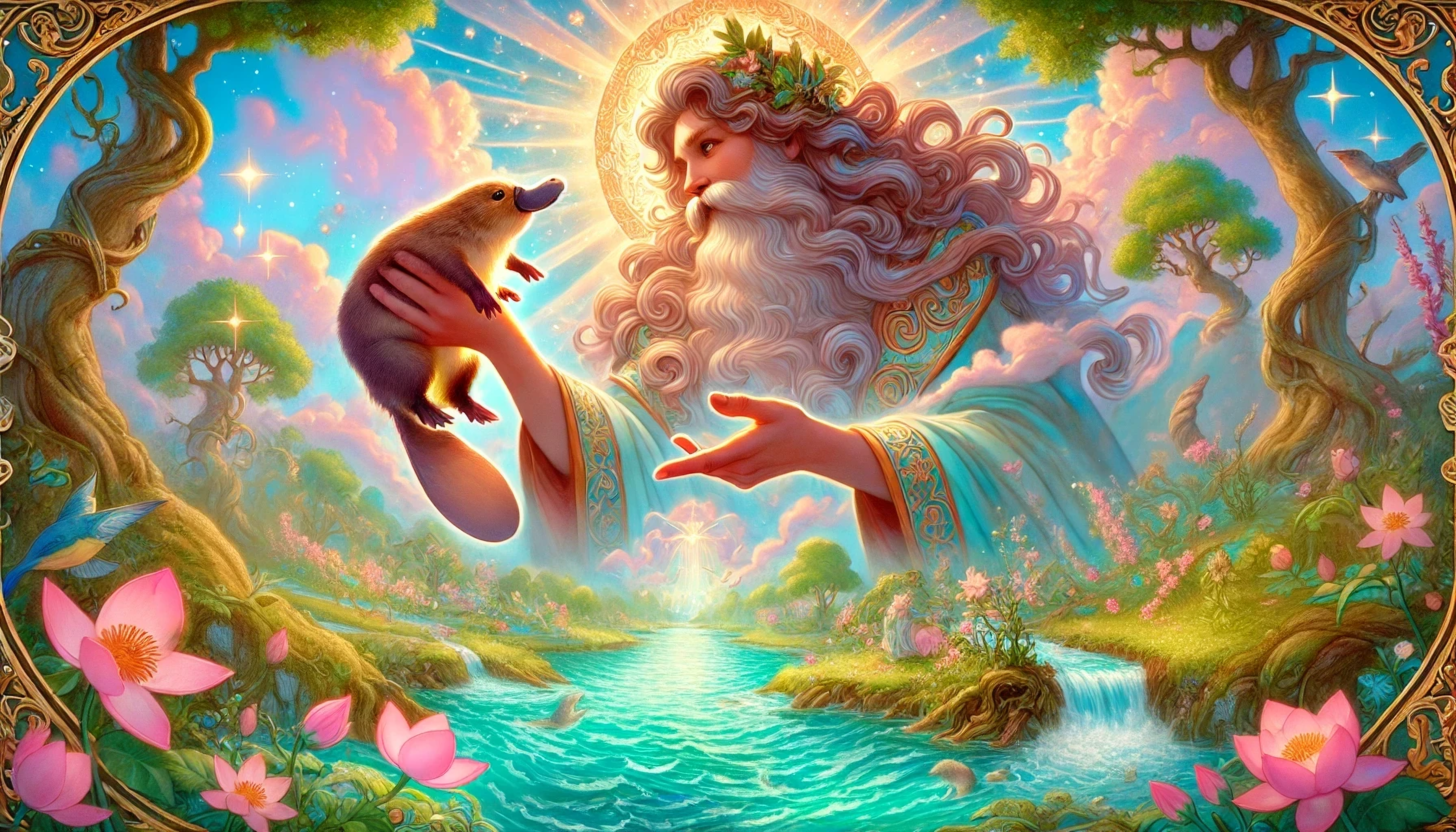
Once upon a time, there was a very lazy duck. Everyone hated the duck, because the duck never wanted to find his own food. Although ducks can eat all kinds of food, and there were plenty of plants in the river for this duck to eat, he always asked other people for their food. All the others found their own food, but this duck could just not be bothered.
One day, this lazy duck was swimming along the river, looking for someone to ask for food. He had already pestered his parents, his twelve brothers and sisters and his fifty cousins, and none of them had any food to give him. Those who did have food hid it before he asked.
So the duck had to look somewhere else for his food, and the first other animal he saw was a beaver with a long, flat tail who was happily eating some wood.
‘Perfect,’ thought the duck. ‘That beaver can’t lie and say she doesn’t have any food – I can see it right there!’
When the beaver saw the duck coming, she said, ‘Oh no! It’s that duck who can’t be bothered to find his own food so he pesters everyone else for theirs!’
‘Hello, Ms Beaver!’ said the duck. ‘Say, that wood looks tasty. Would you mind sharing some with me?’
‘Uh, this wood actually isn’t food,’ said the beaver, thinking quickly. ‘I’m just getting it ready so I can build a dam with it. I need every little piece of wood, you see.’
The beaver pointed to the water beside her, where lots of pieces of wood were floating.
‘What’s a dam?’ said the duck.
‘It’s like a house,’ said the beaver. ‘Oh, but you ducks don’t live in houses, do you? Listen, it’s very complicated.’ The beaver hit the water with her tail. ‘Just know that I need all my wood to build a dam and you can’t have any. Now, I better get back to work. Bye!’
‘I know what houses are!’ said the duck. ‘I’m not stupid!
And the duck was so annoyed that he took one of the pieces of wood.
Big mistake.
‘You nasty little—!’
The beaver jumped on the duck and they started to fight. The beaver fought with her tail and her long, sharp teeth and the duck fought with his beak.
‘Get off my food!’ said the beaver.
‘So it is food!’ said the duck. ‘You lied to me!’
Well, this fighting made such a noise that soon an otter heard and came to see what was going on. When the otter saw the duck and the beaver fighting, he immediately got angry.
‘It’s that duck again!’ he said. ‘That’s the duck who can’t be bothered to find his own food so he pesters everyone else for theirs!’
A few weeks earlier, the duck had asked the otter for a fish, and the otter had said no. So when the otter went for a swim, the duck stole one of his fish that he had left behind for his dinner. The otter was very careful with his food, and before he went for his swim, he counted ten fish. But when he got back, there were only nine fish! He counted them several times and spent a long time looking for the missing fish before he realised what had happened.
‘And now that awful duck is attacking that poor beaver! That simply won’t do.’
So the otter went and joined in the fight. The otter helped the beaver fight the duck, using his sharp teeth to fight.
‘Hey, two against one isn’t fair!’ said the duck.
‘Stealing food isn’t fair!’ said the beaver and the otter.
Now the fight wasn’t only making a lot of noise, but it was also shaking the water. Further down the river, a fish felt the water shaking and wondered what was going on. So she swam up the river and saw the duck, the beaver and the otter fighting.
‘Ah, it’s that horrible otter!’ said the fish.
A few days earlier, the otter had tried to eat the fish. Of course, otters eat fish every day, but this fish very much did not want to be eaten. After she escaped, she said, ‘If I see that otter again, I’ll kill it!’
So the fish joined in the fight as well, fighting with the duck against the beaver and the otter. Of course, fish don’t have sharp teeth or hard tails, or even beaks, so she could not do very much.
‘What are you doing here?’ said the beaver. ‘You’ll be killed!’
‘I’ll bring that otter down with me!’ said the fish. ‘Get ready to die!’
Well, by now the fight was so big and so loud that all the animals in the river and the forest could hear it. And it just so happened that at that moment, God looked down and saw the four animals fighting.
‘Ah, it’s that duck who can’t be bothered to find his own food so he pesters everyone else for theirs,’ said God. ‘Well, what’s going on here? He’s fighting, and with three other animals! That simply won’t do.’
God loved all four of the animals: the duck, the beaver, the otter and the fish. He loved the duck for his beautiful beak, the beaver for her big, flat tail, the otter for his smooth hair, and the fish for her beautiful swimming.
‘If I let this fight continue, they’ll all kill each other! And that would be awful. Hmm… Ah!’
God had an idea. He clapped his hands, and there was a huge clap of thunder.
The fight was over. Where there had been a lazy duck, a beaver, an otter and a fish, there was now just one animal. It had the duck’s beak, the beaver’s tail, the otter’s hair and it could swim like a fish.
It was the first platypus. Of course, the platypus was confused. Just a moment ago, it had been four animals fighting. But now it was a platypus, and platypuses can’t fight themselves, can they? So it swam off to look for food.
And that is how the platypus came to be.
THE END
Thank you for listening to this episode of Easy Stories in English! If you’re wondering what accent the fish had, that was a Scouse accent, an accent from Liverpool. And if you’re wondering what to get your friends and family for Christmas, why not get them my book Easy Stories in English so they can really improve their English reading.
Just go to EasyStoriesInEnglish.com/Book or look it up on Amazon. Happy Christmas shopping!
Leave a Reply